- Home
- »
- Medical Devices
- »
-
Orthopedic Braces And Supports Market Size Report, 2030GVR Report cover
![Orthopedic Braces And Supports Market Size, Share & Trends Report]()
Orthopedic Braces And Supports Market (2025 - 2030) Size, Share & Trends Analysis Report By Products (Braces & Supports Type, Pain Management Products), By End Use (OTC, Hospitals), By Region, And Segment Forecasts
- Report ID: GVR-1-68038-429-1
- Number of Report Pages: 130
- Format: PDF
- Historical Range: 2018 - 2023
- Forecast Period: 2025 - 2030
- Industry: Healthcare
- Report Summary
- Table of Contents
- Interactive Charts
- Methodology
- Download FREE Sample
-
Download Sample Report
Orthopedic Braces And Supports Market Summary
The global orthopedic braces and supports market size was estimated at USD 4,670.9 million in 2024 and is projected to reach USD 7,006.2 million by 2030, growing at a CAGR of 7.3% from 2025 to 2030. Increasing technological advancements, rising number of sports and accident-related injuries, increasing geriatric population, and growing public awareness of preventive care are key drivers in the orthopedic braces and support market.
Key Market Trends & Insights
- North America held the largest market share in the orthopedic braces and supports market in 2024, with a revenue share of 35.83%.
- The orthopedic braces and supports market in the U.S. dominated the North American region in 2024.
- By product, the races & supports type segment dominated the market, capturing a revenue share of 74.97% in 2024
- By end-use, the orthopedic clinics segment dominated the market regarding revenue share in 2024
Market Size & Forecast
- 2024 Market Size: USD 4,670.9 million
- 2030 Projected Market Size: USD 7,006.2 million
- CAGR (2025-2030): 7.3%
- North America : Largest market in 2024
- Asia Pacific: Fastest growing market
These factors contribute to developing innovative products and solutions and distribution platforms for better patient outcomes. For instance, in February 2025, Canadian Orthopedic Supply, a Medical equipment supplier, launched its new website. The company has expanded from a small home office in Georgetown, Ontario, into a nationwide provider of orthopedic bracing solutions. Its product portfolio includes brands such as Push Sport, Push, M-Brace, and Solidea. In addition, the rising prevalence of chronic and acute conditions, such as arthritis and sports injuries, further boosts the demand for orthopedic braces and supports.Major companies in the market are actively involved in initiatives to improve product offerings and expand their market presence, which is expected to contribute to the overall market growth. For instance, in February 2021, BREG, Inc., a provider of billing services and orthopedic bracing, introduced two new product lines called Pinnacle and Ascend. These product lines consist of 15 orthopedic braces specifically designed for patients with spinal injuries. The launch of these new product lines signifies the company's expansion of its product portfolio, allowing them to offer a wider range of solutions to meet the needs of patients with spinal injuries.
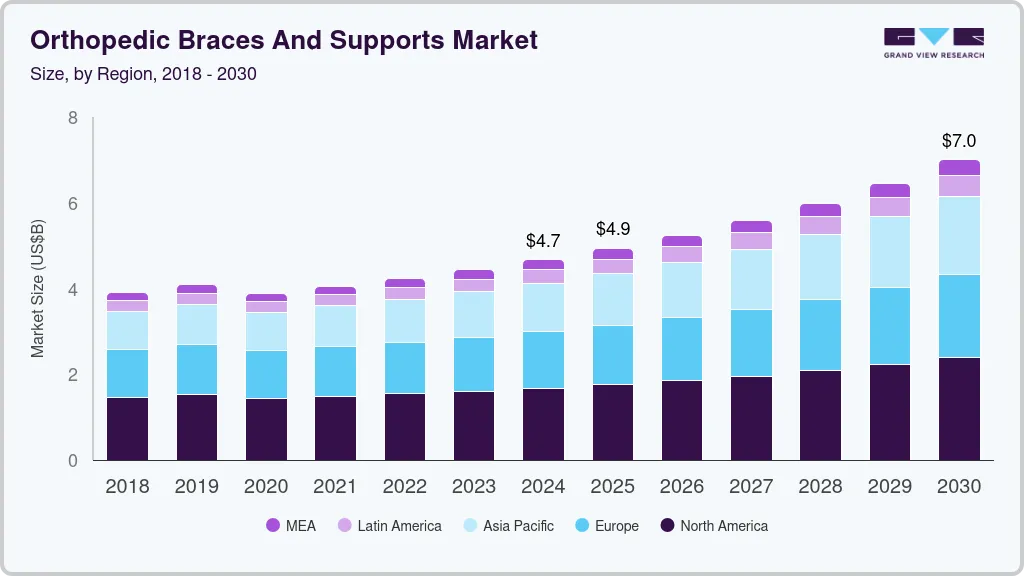
The demand for market products, including postoperative bracing solutions and unloader OA (Osteoarthritis) bracing products, is expected to be driven by factors such as the growing popularity of amateur sports and increased activity levels, contributing to the need for orthopedic braces and supports. The aging population in key markets worldwide creates a higher demand for these products as older individuals are more prone to musculoskeletal issues. Moreover, the rising number of orthopedic surgeries further fuels the demand for postoperative bracing solutions.
Furthermore, the increasing incidence of osteoarthritis, the most commonly occurring form of arthritis affecting individuals of all age groups, significantly drives the demand for orthopedic braces and supports. For instance, according to Arthritis & Osteoporosis Tasmania, in Australia, 3.9 million individuals have arthritis, which is projected to increase to 5.4 million by 2030. This increases the risk of muscle injuries, particularly in the shoulders and knees of older people. Stiffening of the joints is a common issue among older people, emphasizing the need for braces and supports to improve mobility.
Injuries associated with sports are rising due to the increasing number of sports activities. Athletes involved in fitness-related pursuits, including cycling, running, and others, are particularly susceptible to physical injuries, including ligament injuries. Indoor athletes, in particular, face a high threat of ankle ligament tears, leading to a significant demand for ankle braces. For instance, according to the National Safety Council, in the U.S., 445,642 and 409,224 exercise and exercise equipment injuries were reported in 2022 and 2021, respectively. In addition, ankle braces are commonly recommended for recovery from acute ankle sprains. Athletes utilize orthopedic braces to safeguard themselves from injuries during sports activities. These braces aid in restricting unwanted movements during matches, allowing athletes to play with greater ease and convenience.
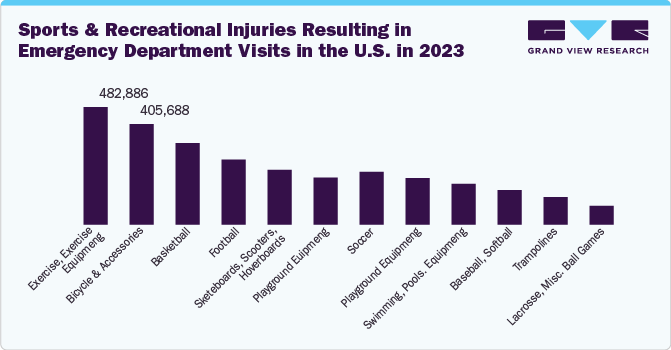
Market Concentration & Characteristics
The global market is characterized by a high degree of innovation, technological advancements, and increased funding for product development. For instance, in December 2023, OrthoPediatrics Corp., a Warsaw-based company, introduced the OrthoPediatrics Specialty Bracing division, focusing on pediatric braces. Moreover, in June 2021, TayCo Brace , a medical device company and manufacturer of ankle braces, raised USD 1.2 million in a seed round financing for the development of orthotic devices.
Several market players engage in acquisition strategies to strengthen their market position. This strategy enables companies to expand their product portfolios, increase their capabilities, and improve competency. For instance, in January 2024, OrthoPediatrics Corp. acquired Boston Orthotics & Prosthetics, a pediatric orthotic management company. This acquisition expands the company's OrthoPediatrics Specialty Bracing division.
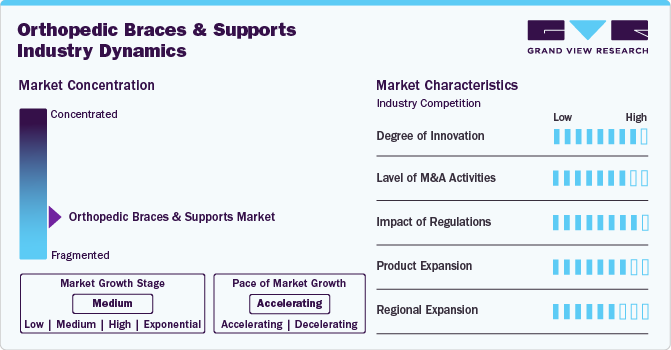
Strict regulatory guidelines issued by different regulatory bodies may hinder market growth. For instance, the European Union Commission has implemented a new regulation for medical devices sold within the European Union. Braces fall under this new medical device regulation. The European market needs to undergo a significant regulatory process to enhance patient safety, followed by strict post-market surveillance.
Several orthopedic braces and supports companies are embracing this strategy to stay competitive and ahead in the dynamically evolving market landscape. For instance, in January 2024, Enovis Corporation introduced the DonJoy ROAM OA knee brace, which is designed for individuals experiencing knee pain, instability, and osteoarthritis. This brace alleviates pressure on the affected knee compartment and redistributes weight away from it, providing dynamic pain relief, enhancing stability, and aiding in mobility improvement.
Market players are adopting a diverse range of strategies, including partnerships, collaborations, mergers, and acquisitions, to expand their footprints in global markets. For instance, in May 2022, Ultra Ankle and Tandem Sport entered into a partnership agreement to accelerate growth for both companies within the rapidly expanding North American volleyball market. The new agreement will incorporate Ultra Ankle’s well-known line of ankle braces into Tandem Sport’s extensive selection of volleyball products.
Product Insights
By products, the races & supports type segment dominated the market, capturing a revenue share of 74.97% in 2024, owing to an increase in orthopedic disorders and injuries, such as arthritis. This segment is subdivided into the back, ankle, knee, upper extremity braces and supports, and walking boots. The rising occurrence of ankle, knee, and upper extremity-related injuries and issues among individuals has significantly increased demand for braces and support products. These injuries can stem from various factors such as sports activities, physical exertion, accidents, or underlying medical conditions. Ankle sprains, knee ligament tears, and upper extremity conditions like wrist fractures or shoulder instability are common examples of such injuries. For instance, according to Datalys Center and Hospital for Special Surgery (HSS), anterior cruciate ligament (ACL) tears increased by 12% between 2007-08 and 2021-22.
In addition, the braces & supports segment is expected to witness the fastest CAGR growth over the forecast period, owing to the growing number of individuals suffering from knee joint-related disorders. Moreover, with a growing awareness of the importance of early intervention and proper support in the healing and management of these injuries, individuals seek reliable and effective braces and support. These products provide stability, compression, and targeted support to the affected area, aiding pain relief, reducing inflammation, promoting healing, and preventing further damage.
In 2024, pain management products held a significant market share due to the rising prevalence of pain-related issues and demand for treating chronic joint and back pain. This segment is bifurcated into Deep Vein Thrombosis (DVT) and cold therapy products. For instance, according to data published by the University of Sydney in May 2023, it is estimated that more than 800 individuals globally will suffer from back pain by 2050. Moreover, strategic alliances among various companies are rising to increase their market reach, further boosting the segment growth. For instance, in January 2025, Aspen Medical Products (Aspen), the provider of pain and mobility management products, acquired Advanced Orthopaedics, a manufacturer of orthopedic bracing solutions. This strategic acquisition broadens Aspen's expertise beyond spinal care, expanding its global presence with a comprehensive portfolio and a focus on customer-driven solutions.
End Use Insights
By end use, the market is classified into hospitals, orthopedic clinics, DME dealers, Over-the-Counter (OTC), and other facilities. In 2024, the orthopedic clinics segment dominated the market regarding revenue share. This demand can be attributed to the rise in orthopedic surgeons and that orthopedic clinics are primary healthcare providers for patients experiencing musculoskeletal pain. For instance, according to an article published by Definitive Healthcare, LLC. in October 2023, there were more than 27,000 active orthopedic surgeons in the U.S.
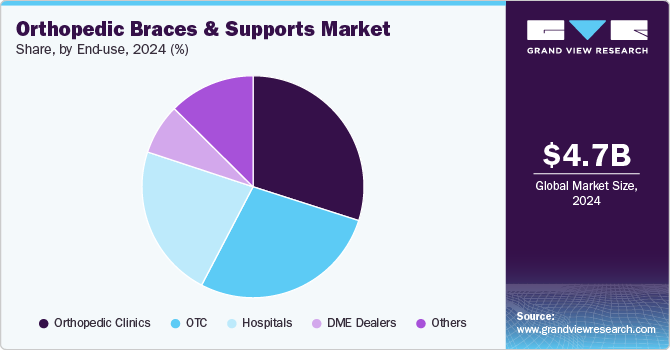
OTC is anticipated to experience the fastest growth over the forecast period. The segment's growth is attributed to the easy availability of OTC-related orthopedic braces in retail pharmacies. Patients suffering from acute muscle pain often prefer OTC products, which aid in reducing recovery time and providing quick relief to injured joints and muscles. The market growth is anticipated to be propelled by the several initiatives undertaken by key companies operating in the market. For instance, in February 2021, Breg, Inc., a billing services provider and orthopedic bracing, collaborated with distributor Club Warehouse based in Australia to expand high-value, premium orthopedic products in the Australian market.
Regional Insights
North America held the largest market share in the orthopedic braces and supports market in 2024, with a revenue share of 35.83%. The dominance of the North American region is attributed to the presence of technologically equipped hospitals in Canada and the U.S. In addition, the region experiences a growing prevalence of chronic conditions, resulting in an increased number of orthopedic surgeries. The expanding geriatric population further fuels this trend as older individuals are more susceptible to orthopedic issues. Furthermore, an article published in March 2022 by Becker's Orthopedic Review highlighted that in 2021 alone, approximately 1 million hip and knee arthroplasties were conducted in the U.S. This statistic underscores the significant volume of orthopedic surgical procedures in the region. Thus, an increased number of surgeries fuels market growth.
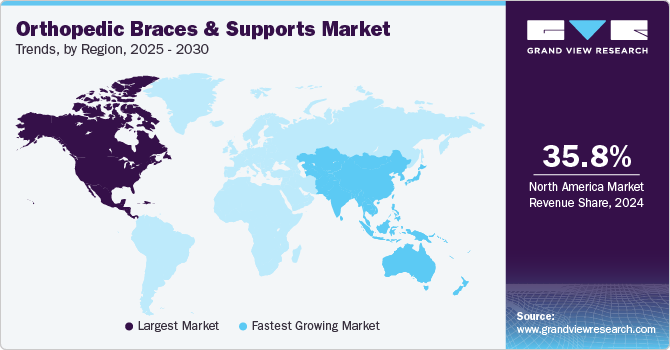
U.S. Orthopedic Braces And Supports Market Trends
The orthopedic braces and supports market in the U.S. dominated the North American region in 2024. Growing government initiatives to accelerate arthritis research and the rise in sports-related injuries are boosting market growth. For instance, according to The Johns Hopkins University in the U.S., approximately 30 million children and teens take part in organized sports each year, resulting in over 3.5 million injuries annually. Nearly one-third of all childhood injuries are related to sports activities.
Europe Orthopedic Braces And Supports Market Trends
The orthopedic braces and supports market in Europe is expected to grow significantly over the forecast period. The region’s strong emphasis on research and development drives ongoing innovation in orthopedic braces, improving product effectiveness and patient outcomes. In addition, supportive healthcare policies and well-established regulatory standards help ensure the safety and quality of these products, contributing to their growing demand among the population.
France orthopedic braces and supports industry is expected to grow significantly during orthopedic braces and supports the forecast period. The government of France introduced the Innovative Medical Devices plan in March 2022 to support the medical device sector as part of the France 2030 project. This strategic plan involves a government investment of USD 450 million in the MedTech industry. French companies and an expanding foreign sales division of global corporations service the market. These companies are often small- or medium-sized enterprises. The rapid import growth further expanded the country's orthopedic braces and support market.
Asia Pacific Orthopedic Braces And Supports Market Trends
The orthopedic braces and supports market in Asia Pacific is expected to grow at the fastest CAGR over the forecast period. This growth is attributed to the growing investments and funding by key companies in the market to develop healthcare infrastructure and expand their geographical presence. For instance, in December 2023, Tynor Orthotics , a leading brand in orthotic appliances, invested Rs 800 crore into an orthopaedic manufacturing facility in Punjab. Moreover, the demand for orthopedic braces and support in the APAC region is propelled by the increasing prevalence of obesity, the growing geriatric population, and increasing healthcare expenditure in APAC countries such as India, China, and Japan.
Japan orthopedic braces and supports market is anticipated to register considerable growth during the forecast period. The increase in the frequency of musculoskeletal problems, the rising geriatric population, and the increase in demand for joint replacement are all factors driving the market's growth in the country. Japan has a highly developed medical device industry with advanced manufacturing facilities and technologies. The availability of resources that enable the development of advanced technologies at cheaper costs is boosting the number of local manufacturing facilities.
Latin America Orthopedic Braces And Supports Market Trends
The orthopedic braces and supports industry in Latin America is anticipated to grow considerably over the forecast period. The rapidly developing healthcare infrastructure in major countries such as Brazil, Argentina, and Chile propels the region's demand for orthopedic braces and supports. Moreover, the number of fractures and joint replacement cases is anticipated to increase due to growth in sports accidents, further fueling the market.
Brazil orthopedic braces and supports market is anticipated to register the fastest CAGR during the forecast period. The country's growing focus on sports and physical activity and rising road accidents boost the market growth. According to the World Resources Institute, Brazil ranks fifth in the world for traffic deaths, with cyclists, motorcyclists, and pedestrians comprising the greatest number of fatalities.
Middle East & Africa Orthopedic Braces And Supports Market Trends
The orthopedic braces and supports market in the Middle East and Africa is witnessing steady growth driven by rising musculoskeletal disorders, increasing road accidents, and expanding orthopedic surgical volumes. The region saw an increased adoption of imported, technologically advanced braces in urban centers, supported by private healthcare investments and growing awareness of post-surgical rehabilitation. The inconsistent reimbursement policies and limited local manufacturing capacity remain challenges.
South Africa orthopedic braces and supports market is expanding due to a high burden of sports injuries, an aging population, and the prevalence of arthritis. Public-private initiatives support growth to improve access to orthopedic care and physiotherapy services. The regulatory framework is evolving under the South African Health Products Regulatory Authority (SAHPRA), leading to delays in product approvals, and limited local R&D continues to slow innovation compared to global peers.
Key Orthopedic Braces And Supports Company Insights
Key players operating in the market include BREG, Inc., Össur, DeRoyal Industries, Inc., and DJO, LLC (Enovis). Frank Stubbs Company Inc., Weber Orthopedic LP, and Ottobock are some of the emerging market players in the orthopedic braces and supports market.
-
BREG, Inc. manufactures and markets sports medicine products. The company sells its products through more than 100 distributors in 36 countries. The company offers hip, knee, spine, elbow, ankle, and foot braces. The company utilizes its well-established distribution network to expand its business geographies and cater to emerging economies.
-
Frank Stubbs Company Inc. is an emerging player that designs and manufactures orthopedic supports, binders, and compression garments for the plastic surgery market.
Key Orthopedic Braces And Supports Companies:
The following are the leading companies in the orthopedic braces and supports market. These companies collectively hold the largest market share and dictate industry trends.
- BREG, Inc.
- Frank Stubbs Company Inc.
- DeRoyal Industries, Inc.
- Össur
- Fillauer LLC
- Ottobock
- McDavid
- Bauerfeind
- Weber Orthopedic LP
- DJO, LLC (Enovis)
- 3M
- Zimmer Biomet
Recent Developments
-
In October 2024, Dr. Brace, a manufacturer of sports orthopedic braces, launched the Dr. Brace Knee Compression Sleeve. It includes 360-degree compression to evenly distribute support across the knee joint, alongside side stabilizers that enhance joint alignment and minimize strain during movement.
-
In January 2024, Enovis Corporation acquired LimaCorporate S.p.A., an orthopedic implant solutions company. Lima strengthens Enovis’ position in the global orthopedic reconstruction market by offering various orthopedic medical devices, including braces.
-
In October 2023, OrthoPediatrics Corp. launched the DF2 Brace to treat kids suffering from musculoskeletal injuries. It is intended for femur fracture fixation in pediatric patients aged six months to 5 years.
Orthopedic Braces And Supports Market Report Scope
Report Attribute
Details
Market size value in 2025
USD 4.93 billion
Revenue forecast in 2030
USD 7.01 billion
Growth rate
CAGR of 7.3% from 2025 to 2030
Base year for estimation
2024
Actual data
2018 - 2023
Forecast period
2025 - 2030
Quantitative units
Revenue in USD million/billion and CAGR from 2025 to 2030
Report coverage
Revenue forecast, company ranking, competitive landscape, growth factors, and trends
Segments covered
Product, end use, region
Regional scope
North America; Europe; Asia Pacific; Latin America; MEA
Country scope
U.S.; Canada; UK; Germany; France; Italy; Spain; Japan; China; India; Thailand; South Korea; Brazil; Mexico; Argentina; Colombia; South Africa; Saudi Arabia; UAE; Kuwait
Key companies profiled
BREG, Inc.; Frank Stubbs Company Inc.; DeRoyal Industries, Inc.; Össur; Fillauer LLC; Ottobock; McDavid; Bauerfeind; Weber Orthopedic LP; DJO, LLC (Enovis); 3M; Zimmer Biomet
Customization scope
Free report customization (equivalent up to 8 analyst’s working days) with purchase. Addition or alteration to country, regional & segment scope.
Global Orthopedic Braces And Supports Market Report Segmentation
This report forecasts revenue growth at the regional & country level and provides an analysis of the latest trends and opportunities in each of the sub-segments from 2018 to 2030. For this report, Grand View Research has segmented the global orthopedic braces and supports market based on product, end use, and region:
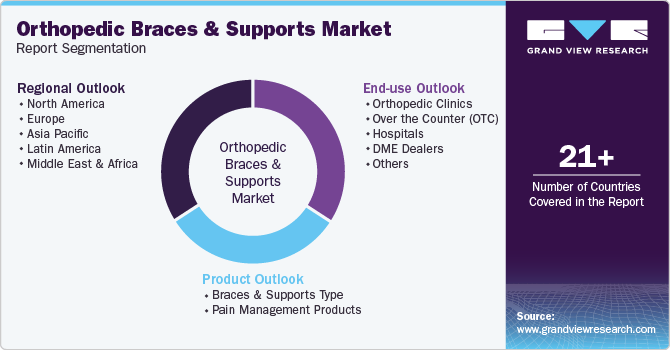
-
Product Outlook (Revenue, USD Million, 2018 - 2030)
-
Braces & Supports Type
-
Knee Braces & Supports
-
Knee Braces for Osteoarthritis and Ligament Injuries
-
Post-operational Knee Braces
-
-
Back Braces & Supports
-
Upper Spine Orthoses
-
TLSOs
-
LSOs
-
Others
-
-
Ankle Braces & Supports
-
Soft Braces
-
Hinged Braces
-
-
Walking Boots
-
Pneumatic
-
Non-pneumatic
-
-
Upper Extremity Braces & Supports
-
Elbow Braces & Supports
-
Wrist Braces & Supports
-
Others
-
-
Hip Braces & Supports
-
Others
-
-
Pain Management Products
-
Cold Therapy Products
-
DVT Products
-
-
-
End Use Outlook (Revenue, USD Million, 2018 - 2030)
-
Orthopedic Clinics
-
Over the Counter (OTC)
-
Hospitals
-
DME Dealers
-
Others
-
-
Regional Outlook (Revenue, USD Million, 2018 - 2030)
-
North America
-
U.S.
-
Canada
-
Mexico
-
-
Europe
-
Germany
-
UK
-
France
-
Italy
-
Spain
-
Norway
-
Denmark
-
Sweden
-
-
Asia Pacific
-
China
-
India
-
Japan
-
Australia
-
South Korea
-
Thailand
-
-
Latin America
-
Brazil
-
Argentina
-
-
MEA
-
South Africa
-
Saudi Arabia
-
UAE
-
Kuwait
-
-
Frequently Asked Questions About This Report
b. The global orthopedic braces and supports market size was estimated at USD 4.67 billion in 2024 and is expected to reach USD 4.93 billion in 2025.
b. The global orthopedic braces and supports market is expected to grow at a compound annual growth rate of 7.3% from 2025 to 2030 to reach USD 7.01 billion by 2030.
b. North America dominated the orthopedic braces and supports market with a share of over 35.83% in 2024. This is attributable to rising awareness regarding bracing devices that aid mobility and prevent further injury.
b. Some key players operating in the orthopedic braces and supports market include Össur, BREG, Inc., DeRoyal Industries, Inc., Bauerfeind, • DJO Global, Inc., Ottobock, Fillauer LLC, Frank Stubbs Company Inc., and McDavid, Hely & Weber.
b. Key factors that are driving the orthopedic braces and supports market growth include rising incidence of osteoarthritis, increasing cases of sports-related injuries, and growing geriatric population bases.
Share this report with your colleague or friend.
Need a Tailored Report?
Customize this report to your needs — add regions, segments, or data points, with 20% free customization.

ISO 9001:2015 & 27001:2022 Certified
We are GDPR and CCPA compliant! Your transaction & personal information is safe and secure. For more details, please read our privacy policy.
Trusted market insights - try a free sample
See how our reports are structured and why industry leaders rely on Grand View Research. Get a free sample or ask us to tailor this report to your needs.










